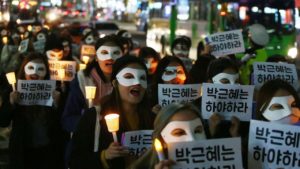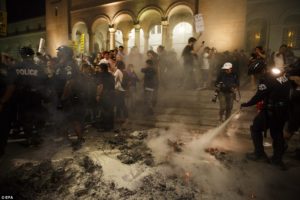Special to WorldTribune.com
 By Donald Kirk
By Donald Kirk
Too bad President-elect Donald Trump’s phone call to President Park Geun-Hye the day after his victory may be his only chance to talk with her. Even if she’s still in the Blue House when he moves into the White House, she’ll be in no position to display her leadership at summit conferences.
Sadly, Trump’s first meeting with the leader of a foreign country was his conversation Thursday in New York with Japan’s Prime Minister Shinzo Abe.
Ordinarily Koreans might respond with nationalist sensitivity to the incoming U.S. president meeting the Japanese leader before their own leader, but everyone knows these are not ordinary days.

Korea now is essentially leaderless — without even a symbolic head of state, a king or queen before whom to pay obeisance. Park might now aspire to the ceremonial role of figurehead while a prime minister tends to tawdry everyday affairs, but she may be denied even that luxury.
Is South Korea about to succumb to the demands of the parliament of the streets? How long can Park’s presidency survive the outcries of her foes — and her friends too? Not only liberals and leftists but also moderates and conservatives are saying her days in Cheong Wa Dae are numbered.
North Korea, of course, couldn’t be happier by what its propaganda machine sees as the breakdown of South Korean (and U.S.) society, and the North’s pro-North followers in the South and the U.S. are quick to echo the line.
For Koreans, the campaign against Park has totally undermined her ability to govern. Once resolute on North Korea, she now has lost power over domestic and foreign policy in the face of a populist assault not seen in Seoul since the mass protests against Chun Doo-Hwan in June 1987. Chun, the general who had taken over from Park’s father, dictator Park Chung-Hee, after Park’s assassination by his intelligence chief in October 1979, had to agree to a “democracy constitution” and presidential elections every five years.
At meetings of Park Geun-Hye’s aides and ministers, convened to consider the impact of Trump’s election, her views about whether he would do away with the Korea-U.S. Free Trade Agreement or cut down the number of U.S. troops in South Korea are irrelevant.
Koreans these days, accustomed to news of bribery, embezzlement, trials and convictions of big shots, are so obsessed and outraged by revelations of such disgraceful conduct in Park’s administration as to be downright embarrassed.

No doubt Park suffered terribly from the loss first of her mother, killed in 1974 by a bullet intended for her father, and then of her father, but how deeply was she taken in by Choi Soon-Sil, with whom she developed such a sisterly relationship? Did Soon-Sil, whose father, Choi Tae-Min, pastor of the Church of Eternal Grace, inveigled his way into Park Chung-Hee’s inner circle, induce Park’s daughter to share state secrets after her election as President?
And did Choi, after the death of her own father 22 years ago, lead Park Geun-Hye into joining in shamanist rituals — and then have a hand in policy decisions though she never held any office? How much did Park have to do with those two mysterious foundations through which funds from some of Korea’s biggest corporations, such global names as Samsung Electronics and Hyundai Motor, were channeled into Choi Soon-Sil’s properties in Germany?
Shots of Choi’s daughter sitting proudly on a gorgeous horse during lessons in dressage at a riding school near Frankfurt add a touch of glamor and fun. We’ve heard of companies lavishing gifts and favors, but who would believe Samsung financed a horse?
So much more needs to come to light. How did the cable TV station JTBC come into possession of the tablet computer on which they found emails incriminating Choi and members of Park’s staff? Did someone place the tablet in JTBC’s hands in order to get Choi — and Park too? And what was going on at the culture ministry, where people had been losing their jobs for raising questions? How deep was the rot at other ministries?
The case provides a glimmering into the corruption that surfaces regularly in Korea. Inevitably, investigators discover patterns of bribery and influence-peddling, of misplaced loyalty and perjury. The investigation also raises disturbing questions about the infiltration of an illicit intruder into the life of the president — and the danger to policy-making, to national security, to the rule of law.
It’s difficult to know what’s more compelling — the unraveling network of connections formed by Choi, with Park’s blessing, that penetrated multiple layers of government and business or the protest in central Seoul on the way to the walled palace of ancient Korean kings and Cheong Wa Dae. Together they form a combustible mixture that may explode in a tectonic shift in leadership with implications for policy toward North Korea.
These shows of popular force in Seoul, however, have not only been far more peaceful than those in the U.S. but also have far greater significance in their ability to alter the course of history. The spectacle of protesters in Seoul carrying candles in paper cups provides an antidote to the specter of mobs trashing cars in American cities even as the U.S. stands on the precipice of an uncharted new era.
While Park’s presidency may not survive, Trump is sure to be inaugurated in January — whether those shouting “not my president” like it or not.
Donald Kirk has witnessed protests in Seoul since the 1970s. He’s at kirkdon4343@gmail.c
